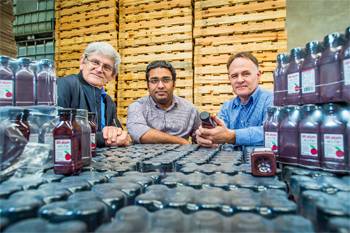Dr Sunil Panchal Functional Foods Festival Interview

Dr Sunil Panchal Functional Foods Festival Interview
Vegetable beer, purple carrots and Queen Garnet plum juice are just some of the fruits of the larder which will be on display and up for discussion at University of Southern Queensland's (USQ) first ever Functional Foods Festival.
Being held on campus in Toowoomba and Ipswich from August 8th to 11th, the festival will showcase the importance of what is and could be grown in the region to provide health benefits to communities.
It includes a Food for Health Symposium, with Canadian Professor Peter Jones, who has been brought to Australia by USQ as a Visiting Research Giant, as the keynote speaker.
'The University's work in developing foods with health benefits has attracted international attention, and is an area of research that makes us enormously proud," USQ Vice-Chancellor and President Professor Jan Thomas said.
'Professor Jones is one of the worlds' leading researchers in functional foods, and we are delighted he is able to be part of this festival with our own highly acclaimed team and other specialists to give the public an idea about this developing sector," Professor Thomas said.
Professor Jones is the founding Director of the University of Manitoba's Richardson Centre for Functional Foods and Nutraceuticals, which has worked closely with USQ's Functional Foods Research Group (FFRG).
Led by Professor Lindsay Brown and Dr Sunil Panchal, FFRG research has identified foods which can help reduce obesity and improve the structure and function of the heart and liver.
The FFRG's findings have helped to change the way the public views the connection between food and health, and have found functional foods may relieve inflammatory conditions such as arthritis, inflammatory bowel disease and chronic kidney damage.
'Functional foods are also likely to help promote healthy ageing, and decrease the impact of inflammatory and metabolic diseases which can have such a big impact on people's quality of life as they age," Dr Panchal said.
'As such, this is really important research for the people in our region and beyond," he said.
As well as involving researchers from other universities, the symposium will include presentations from Nutrafruit, the Queensland company which has commercialised the Queen Garnet plum, and MDB Energy, which has developed high-value algae-based foods.
Professor Brown said the development of functional foods as an industry presented opportunities for food producers and processors as well as researchers and investors.
'Toowoomba and its surrounding regions have a long and proud history of growing fruit and vegetables, and of processing food."
'We look forward to telling people about where that is leading as food starts to interface with medicine," Professor Brown said.
Professor Jones will be speaking at all four Functional Foods Festival events. The festival kicks off at USQ Toowoomba with an afternoon lecture for schools on Monday August 8, followed by an evening public lecture on Tuesday and the symposium on Wednesday, August10.
The festival's final event is a public lecture at USQ Ipswich on Thursday August 11.
Interview with Dr Sunil Panchal
Question: What is the Functional Foods Festival?
Dr Sunil Panchal: The Functional Foods Festival is the celebration for increasing public awareness of the health benefits of functional foods and the unique role that USQ researchers have played in creating that awareness. In 2015, USQ researchers received a well-above world-class rating in the Excellence in Research for Australia (ERA) ranking system for their research on functional foods. This festival will feature leading experts from USQ and around the world to showcase the importance of what can and should be grown in the region to provide health benefits to communities. The Functional Foods Festival will include a one-day Food for Health Symposium, as well as public lectures, to showcase how medicinal properties of certain foods can be identified and translated to provide benefits to the community. At the inaugural USQ Functional Foods Festival, we will be celebrating new opportunities in the global 'super foods' market.
Question: What are functional foods?
Dr Sunil Panchal: Functional foods are defined as foods that not only provide nutrition but also improve people's health by preventing or reducing chronic and inflammatory disorders, such as obesity.
Question: Can you share with us information about new developments in functional foods?
Dr Sunil Panchal: With increasing public awareness of the health benefits of functional foods there is a challenge to develop innovative ways of incorporating them in our existing diets. Commonly, a combination of foods are now being developed to deliver greater functional benefits than the individual foods.
Question: What do you hope to achieve from the Functional Foods Festival?
Dr Sunil Panchal: We hope to develop a network of primary producers, researchers and industries that can work together in order to develop better strategies to solve the food security in future but also provide the food with beneficial effects. This will bring the food researchers to work closely with each other to improve the evidence status for medicinal effects of foods grown locally.
Question: What are the health benefits of the Queen Garnet plum juice?
Dr Sunil Panchal: Queen Garnet plum is a rich source of purple coloured pigments called anthocyanins. These anthocyanins are anti-oxidant and anti-inflammatory in nature. These two characteristics of the pigments make them suitable for targeting chronic inflammatory diseases in the community. Research has shown that the Queen Garnet plum can reduce blood pressure as well as blood glucose in overweight individuals.
Question: How does Queen Garnet plum juice reduce obesity?
Dr Sunil Panchal: Obesity is a low-grade chronic inflammatory condition with metabolic disturbance and oxidative stress in the body. The anthocyanins from Queen Garnet plum are able to reduce the inflammation and oxidative stress in the body and also correct the metabolic disturbances. Hence, Queen Garnet plum is able to reduce obesity as well as obesity-related tissue damage.
Question: How is best to consume the Queen Garnet plum juice?
Dr Sunil Panchal: Queen Garnet plum is quite tasty as fresh fruit, so consuming the fresh fruit would be a delight. However, the fruit only lasts for 6-8 weeks of the year, so it is not a sustainable way of consuming the anthocyanins through these plum. The company producing Queen Garnet plum is converting these plums into juice and selling it in the market, so this would be a longer term solution, but the company is now also converting the juice into a powder, so this can be even better way of consuming these pigments throughout the year.
Question: What inspired the development of the Queen Garnet plum juice?
Dr Sunil Panchal: The Queen Garnet plum was developed by Department of Primary Industry (now Department of Agriculture and Fisheries). These plums contain a much higher amount of anthocyanins than similar varieties of plums and hence these were supposed to be beneficial for health. Our previous work with purple carrots had given amazing results in obesity and arthritis, so we decided to test Queen Garnet plum for similar benefits. The results from our studies are now public and these plums are as effective as the purple carrots.
Question: Can you talk about the correlation between functional foods and quality of life?
Interview by Brooke Hunter
Image: From left, USQ researchers Professor Lindsay Brown and Dr Sunil Panchal with Hugh Macintosh, Director of Nutrafruit, and a consignment of QG plum nectar ready for despatch from Nutrafruit's facility within the Harrowsmith International warehouse in Brisbane.
MORE





